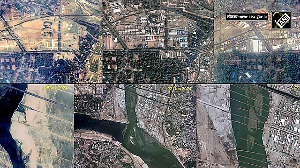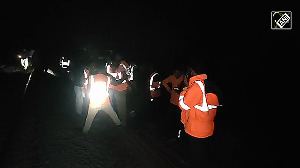The Maoist rebels' call for an indefinite nationwide road blockade made a deep impact on the opening day (Saturday) in at least large parts of north-western and mid-western Nepal.
The Maoists had a field day on what marked the commencement of the 10th anniversary of the Maoist movement in the Himalayan Kingdom.
They made their presence felt in several villages on the periphery of Nepalganj town, where local area commanders of the 'Red Army' addressed roadside rallies.
| |||||||||||
There were also reports of a few bomb explosions.
One of the blasts occurred barely 300 metres from where this scribe was filing the story at around 1830 IST.
Security personnel quickly cordoned off the area. They were not willing to speak and so the extent of damage was not known.
Public transport like buses, minibuses and commercial jeeps remained off the roads and private vehicles were few and far in between.
Only cycle-rickshaws, bicycles and, of course, a lot of pedestrians were on the roads.
The local bus station wore a deserted look, while petrol pumps had no business.
Cops and military personnel were visible only in the town. Barely 10 km outside, even the regular police posts looked abandoned.
The only motorised vehicles on the highways leading to the neighbouring districts belonged either to the Royal Nepalese Army or paramilitary forces.
Even though shops are closed on Saturdays, many shopkeepers opened the shutters. But business remained very low. "Perhaps people are scared to venture out even though there is no call for a bandh. But you really don't how swiftly things can take a turn," said an Indian trader who has been living in Nepalganj for decades.
For security reasons no one wanted to be identified.
"We are not even taking out our two-wheelers for fear of being attacked by the extremists," remarked a local journalist.
The Maoists have called for a two-day bandh on Monday and Tuesday and no one is willing to take chances.
A local hotelier who was cycling around the streets said, "There is no question of violating the diktat of the Maoists. Even if they spare you today, they will gun you down after 10-15 days, so it is sensible to play safe and keep your cars away."
Asked how long the vehicles would remain off the roads, an official at the local transport office said, "Well, your guess is as good as mine. Since the call is for an indefinite blockade, we have no choice but to abide by it."
"Transporters are not willing to take the risk of operating on the highways for the simple reason that they will be targeted by the Maoists," he added.
When a transporter's attention was drawn to the extensive patrolling by the army -- even helicopters were maintaining aerial surveillance over the Maoist-infested areas -- he said, "Army camps and patrolling cannot cover every inch of the place while the Red Army can get you from anywhere; after all they are known to have blown up army, police and other government vehicles by planting mines on the highways."
He was right.
There was heavy security in the town, especially around the office of the senior superintendent of police and the local police lines. Even the police outpost near the Nepalganj airport on the outskirts of the city was without a single cop at 6 pm.
Local military officials were not easily accessible and civil authorities choose to remain tight-lipped. "I am not authorised to give any official statement to the media," Nepalganj chief district officer (equivalent of a district magistrate in India) Dilli Raj Joshi said.
Meanwhile, it is officials working for various government departments who appear to be most terrorised, particularly since three employees of the National Industrial Development Corporation were injured in a bomb attack in downtown Nepalganj on Friday afternoon.
"When uniformed and armed military personnel are not safe, then what to talk about us?" said an official.






 © 2025
© 2025